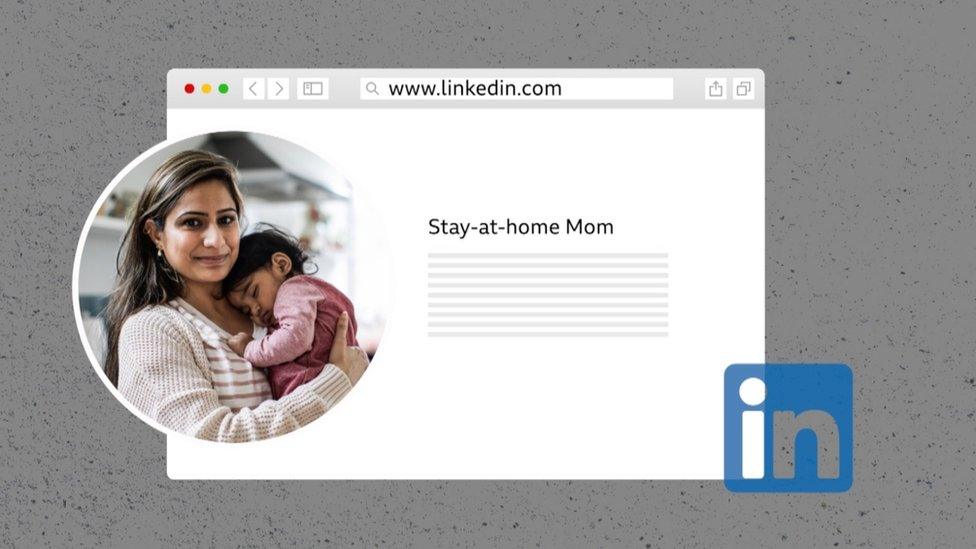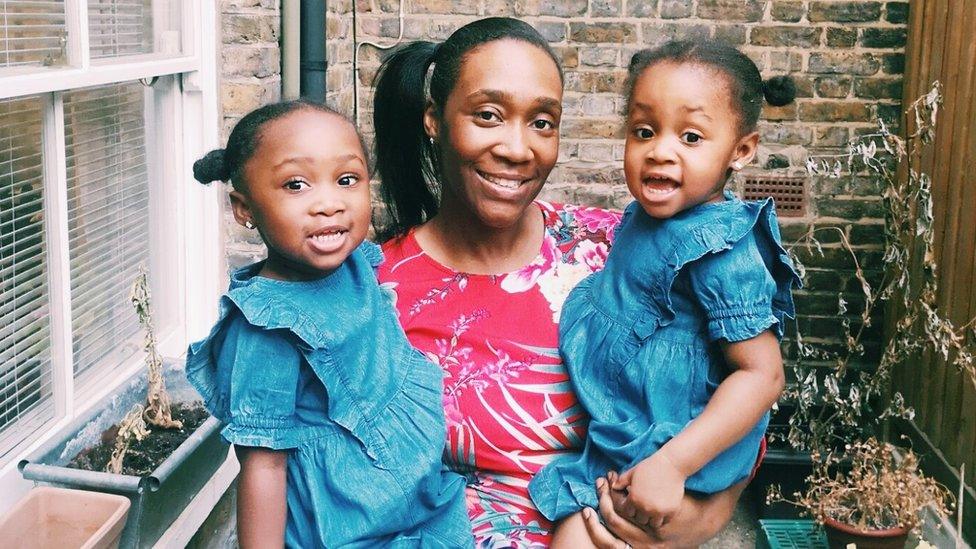Why 'stay-at-home parent' is a job title
- Published

Gains for women in the workplace have been further damaged by the Covid-19 pandemic
Many women returning to the workforce after having children say they face a challenging welcome back. Professional networking site LinkedIn recently added a new feature, allowing parents to use "stay-at-home mom" or "stay-at-home dad" as a job title. Will it make a difference?
In January 2020, after more than a decade raising her two young children, Heather Bolen was ready to rejoin the workforce.
On Bolen's resume was a master's degree and record of her successful corporate career at Starbucks. But for the past eleven years she had been a full-time parent - not a title recognised by most corporate recruiters.
Bolen logged on to LinkedIn to begin her search. But she couldn't find an easy way to explain her time away from the corporate world on the site. In the drop-down menu, there was no option for "stay-at-home mom".
"I hit a wall immediately," she told the BBC.
To Bolen, it was an early sign that 11 years at home would be a tough sell to some companies.
To many US employers, her time raising two children, managing her family's finances and coordinating two international relocations (to Amsterdam and back) was simply a gap in her employment.
Some parents attempting to return to work have opted for the title "homemaker" - a label that LinkedIn provided - on the site to explain career gaps. Others have improvised, using makeshift titles like "Family CEO" or "Chief Home Officer".
Bolen went with Family COO (Chief Operating Officer). But she didn't want women "having to do a dog and pony show" to justify their experience.
"Why do we have to be so silly about this?" she said. "We had babies!"
In an article published by Better Marketing in March, Bolen outlined her frustrations with what she described as an "implicit bias" against women.
Weeks later, LinkedIn announced it would introduce a number of new job titles, including stay-at-home mom and stay-at-home dad, as an option to better reflect pauses in employment.
The change is a "great start", Bolen said.
But for American women who left paid work for full-time childcare, that employment gap is a liability when trying to re-enter the workforce - and it may be getting worse.
An 'impossible situation' for families
About one in five American parents stay home for a period of time after having children, according to the Pew Research Center.
The number of dads who stay home after having kids has increased slightly, from 4% in 1989 to 7% in 2016, but mothers are roughly four times as likely to be the stay-home parent today.
The US is among the only industrialised countries without mandatory paid family leave.
The national requirement for employers is 12 weeks off, unpaid. States and individual employers may have their own stipulations, but many women in the US do not have any paid leave at all.
"A lot of women end up dropping out of the labour market after giving birth to a child because they don't have any leave entitlements and the childcare prospects are not good," said Jennifer Bennett Shinall, a law and economics professor at Vanderbilt University.
"We force families into an impossible situation in this country."

LinkedIn will now have 'stay-at-home mom' as a listed job title
While living abroad with her family, Bolen remembers hearing comments from other parents about "American women, who have babies and then just quit working".
"American women do that because they don't have the built-in support," Bolen said.
Of the women who leave work after having children, two-thirds plan to return to work within five years. But those who want to resume paid work often find a labour market less enthused about their return.
According to one 2018 study, stay-at-home parents are half as likely to get a job interview, external than parents who have been laid off. Employers said they viewed stay-at-home parents as less reliable, less deserving and less committed to work than unemployed parents.
And the mothers who do find a job are often penalised for their time away. According to another study, women who spend three years or more out of the workforce lose 37% of their earning power, external.
"Study after study has shown that even the women who do successfully re-enter the workforce after a career break never fully catch up to their earnings potential," said Prof Shinall.
Some women who leave the workforce temporarily to have children never return.
The number of women in the paid workforce overall has fallen slowly since it peaked in 1999. Since the coronavirus pandemic, 2.3 million women have left, bringing their labour participation rate to levels not seen since 1988, according to the National Women's Law Center.
According to a 2019 report from Pew, nearly a third of those who do return to work don't do so full-time, while others, like Bolen, become self-employed.
President Joe Biden has promised to address some of these underlying issues with efforts like paid family leave and expanded access to affordable child care, something the administration has indicated could be announced later this spring.
'I felt so embarrassed for having stayed home'
Still, for many mothers, returning to work means wrestling with that blank space on their CV.
"For all of the skill sets that I have, both from my corporate life, from international moves, from my own education … I felt so embarrassed for having stayed home with my children," Bolen said.
"I was completely incredulous that I felt shame."
'I was told to be "less young and girly" to progress'
She said her inclination was to "hide" the gap - a common instinct, said Prof Shinall.
"Career counsellors across the board advise women who have taken a career break for childcare reasons to hide or try to disguise the fact that they had this gap on their resumes," she said.
With her colleague, Professor Joni Hersch, Prof Shinall has conducted research on women returning to the labour market who try to conceal their time at home.
"What we found was that advice absolutely backfired for women," she said. "Our study suggests that it is always better to be explicit and clarify gaps and career breaks on your resume."
But the struggle of women who want to return to work remains a "terrible problem", said Prof Shinall, even for those who are up front about their time away.
Bolen ultimately abandoned her search for corporate employment.
She is now pursuing an entrepreneurial career instead. On her LinkedIn page, she is listed as a writer and founder of a digital travel and culture site, providing virtual history and travel courses.
The freelance route has a lot of positives, Bolen said, including flexibility and more time to write. But she wonders if she retreated from the corporate world, in part, because she "felt how difficult it was going to be" to apply for more traditional positions and defend her career "gap" in the process.
"Was it partly out of not wanting to face all of that?" she said.
Graphics by Angélica Casas
Related topics
- Published18 March 2021

- Published30 September 2020

- Published27 March 2021
